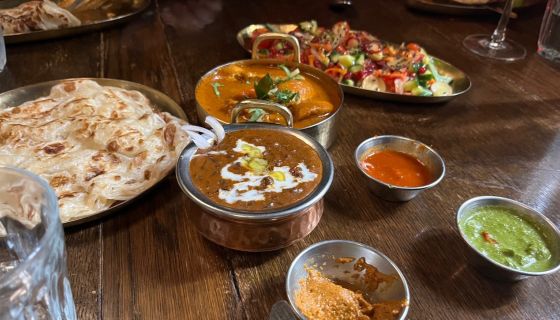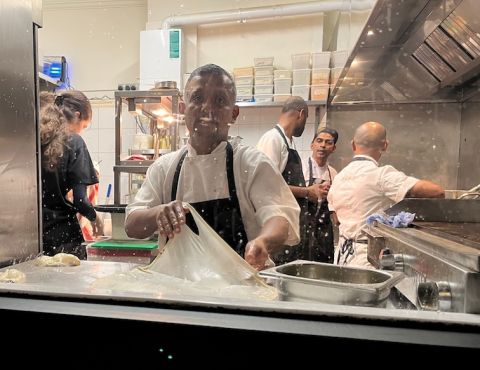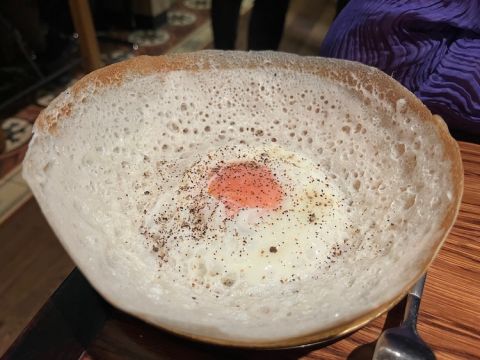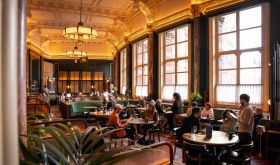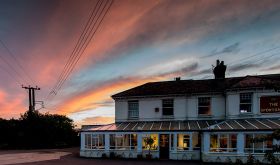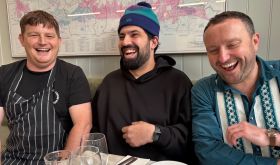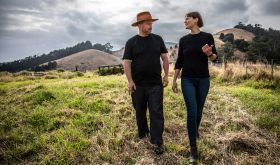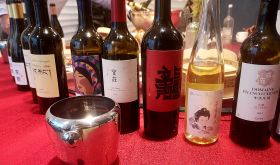It’s almost impossible to get a booking in a relatively new restaurant in a former pub once called The Cuckoo in Islington, north London, with an unusual name that matches exactly the style of cooking on offer. There’s an overspill space under white tenting along one side that accommodates six tables of four on the pavement, but if this review whets your appetite you’ll have to jump on the restaurant’s website exactly a month before your chosen date – preferably early in the morning.
Welcome to The Tamil Prince on Hemingford Road, which opened as recently as June 2022. It still looks very much like a dark pub with a busy bar on the right and a very busy kitchen at the far end clearly visible through a large window under which we sat at table 6 with a great view of the rotis being lovingly rolled out and folded before being put on the griddle.
This is the second restaurant (Tamila in Hackney was their first) from chef Prince Durairaj (born in Tamil Nadu, southern India) and general manager Glen Leeson, who met at the well-known Roti King in Euston – outside which there seems to be a perpetual queue. The Tamil Prince is so incredibly popular because this duo have concentrated on the essentials. Little of the interior has been changed and the menu is printed on a single sheet of paper. Instead, everything has been spent on ensuring that the food is authentic and that it is served by knowledgeable, enthusiastic waiting staff.
The menu offers six small plates, six large plates, a couple of extras which include the unmissable ‘buttery, flaky roti’ and four desserts. The four of us ordered all the small plates, the Thanjavur chicken curry and the paneer butter masala, four rotis and two desserts. Following Tam’s advice in a forthcoming podcast that we’ll be releasing later this year that rosé is the perfect accompaniment to such spicy food, we shared a bottle of pink Côtes de Provence 2021 (£33) and a couple of desserts before I paid my bill of £144.59, which included a Cobra beer for one of our party.
All the small plates were excellent. The tiny okra fries were crisp and spicy. The onion bhajis were almost sweet – much less greasy than most – and the dhal was thick and pungent. The pulled-beef uttapum was the slow-cooked meat crammed into an uttapum, a southern Indian dosa, that was irresistible and made even more so by a chili coconut chutney, a dish that contrasted well the crisp chicken lollipop. Best of all, unexpectedly, was the Indian desi salad, a simple compilation of finely diced kidney beans, cucumber, tomatoes, coriander, green chilli, spicy seeds and topped with sweetened lemon juice.
The main courses and desserts were just as good but what I will remember for a long time about my meal were the smiles on all of those who work here. Our well-placed table allowed me to spend most of the evening with one eye glued to the kitchen where even the man in charge of the boiling hot, remorselessly busy roti grill was smiling. As were all the waiting staff we encountered. This is impressive.
One of the misapprehensions that I was labouring under was cleared up a few days later over a beer at Hoppers, King’s Cross, with Karan Gokani, the man who, when not talking and smiling at the same time, founded Hoppers restaurants in Soho in 2015 when he reopened the site that had been Alastair Little’s restaurant way back when. The restaurants are named after Sri Lanka’s famous egg hoppers, pictured below.
Gokani, who now supervises a 160-strong team since opening two other Hoppers, in Marylebone and King’s Cross, was born in Mumbai. After completing a second degree, in law at Cambridge, he moved to London to work for Linklaters and it was here that the Sri Lankan bug first bit. His subsequent marriage to Sunaina Sethi, the female, wine-loving member of the team behind JKS Restaurants, led him to become a hospitality professional.
‘Our food and that of the increasing number of Sri Lankan restaurants across the UK is not strictly Sri Lankan’, he explained to me patiently, ‘but it is Sri Lankan/southern Indian. A lot of our ingredients are shared.’ This explains why the Thanjavur chicken curry we enjoyed so much at The Tamil Prince is named after the biggest city in Tamil Nadu.
When I asked Gokani to name some specific Sri Lankan ingredients, he jumped up, strolled quickly across to the reception area and picked up a copy of the recently published Hoppers cookbook, which weighs in at an impressive 1.5 kg. Opening his book at the Larder chapter, he listed several ingredients which are specific to Sri Lanka. ‘There is jaggery, of course, the ultra-sweet, boiled sap of the coconut, palmyra or kithul flowers; there are Sri Lankan chillis, which tend to be stronger in intensity than chillis from other countries; jackfruit; and also goraka, the de-seeded segment of a fruit found in the south of the island. But then, most particularly, there are the Maldives fish which, as in Japan, are like dried bonito flakes and contribute umami and are added to give sambols their authentic flavour.’
I have to admit that I have trouble resisting another southern Indian dish, the bone-marrow varuval (fried), whenever I visit a Hoppers.
Such has been the acceptance of Hoppers as an expression of fun, excitement and a close association with Sri Lankan food and colour that Gokani decided that the time has come to proclaim this by, as it were, going on the offensive – not least because Sri Lanka itself is in such a parlous state today.
So a year ago he teamed up with Shake Shack, the American burger chain, and launched a special cheeseburger topped with curry-braised short rib, coriander chutney mayonnaise, mustard cream, pickled red onion, fresh coriander and green chilli. When we met, Gokani had just returned from New York, where this so-called Lankan Shack has been on the Shake Shack menu and it was encouraging to see, Gokani reported, how Sri Lanka was becoming ‘a platform that people were talking about. It was as if we were flying a flag for a nation.’
At the same time, Gokani has begun to use financial contributions from Hoppers to send much-needed food parcels to Sri Lanka. After a chance meeting in the restaurant with a senior executive with Hemas, a leading Sri Lankan company focusing on healthcare, in February 2022 Gokani set up Feeding the Future, a programme that, via contributions of a £1 a table as well as staff contributions, has so far sent over £30,000-worth of care packages to schoolchildren in Monaragala in the south-east of Sri Lanka.
Finally, comes another Sri Lankan cookbook and a new Sri Lankan restaurant in London, both called Rambutan and the creation of the charming Cynthia Shanmugalingam. As the surname would suggest, Cynthia is of Sri Lankan origin, although born to parents who emigrated to Coventry in the British Midlands from Sri Lanka in the 1960s. The restaurant will open shortly at 10 Stoney Street, close to London Bridge.
Meanwhile, her cookery book will have to suffice. Subtitled Recipes from Sri Lanka, this book definitely has a more homely feel than the Hoppers cookbook. I found the recipes for a burnt aubergine sambol with coconut milk, the Jaffna crab curry and the mango fluff pie enticing and likely to turn up on our table quite soon.
London is fortunate to have such a range of Sri Lankan food on offer at the moment and one that is likely to grow, I am delighted to say.
The Tamil Prince 115 Hemingford Road, London N1 1BZ
Hoppers restaurants 49 Frith Street, Soho, London W1D 4SG; 77 Wigmore Street, Marylebone, London W1U 1QE; Unit 3, 4 Pancras Square, King’s Cross, London N1C 4AG
Hoppers: The Cookbook, Karan Gokani (Quadrille, 2022) 352 pp, £30/$42
Rambutan: Recipes from Sri Lanka, Cynthia Shanmugalingam (Bloomsbury, 2022) 336 pp, £26/$35

